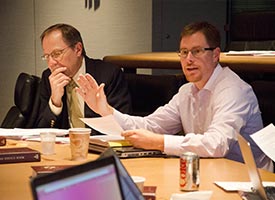By Jeni Miller
During its December meeting in Orlando, Fla., the LCMS Commission on Theology and Church Relations (CTCR) adopted three documents:
- a report offering guidance for preparing Communion statements,
- a report reviewing recent Synod statements on women’s service in the church and
- a Bible study titled “Why Are You Persecuting Me? A Christian Response to Hostility and Persecution.”
The first two documents came as a result of requests to the CTCR from the Synod president.
“The Communion statement request was the result of President Harrison conducting visits to the various districts and congregations of the Synod,” recalled the Rev. Larry Vogel, associate executive director of the CTCR.
The brief, 7-page document describes the CTCR’s rationale and historical context for providing such a document, builds on a model Communion statement previously prepared by the CTCR and commended by the Synod, and also evaluates several sample statements to help guide congregations in creating their own faithful Communion statements — with a goal toward unity in understanding and practice around the Synod.
“I requested the document on Communion statements because I so often see bulletin statements that invite all who are baptized or Christians, or believe in the ‘real presence,’ to come to Communion,” said LCMS President Rev. Dr. Matthew C. Harrison. “This is not, and has never been, the position of the church. The Synod voted at well over 70 percent at the last convention requesting that the president of the Synod urge district presidents to work with congregations to ensure practice faithful to the Scriptures and Lutheran confessions. We all agree that there is ‘pastoral discretion’ in that there are times when, for pastoral concerns, a person perhaps who is not formally a member of the LCMS or a partner church may be communed. No one questions that. We disagree on the limits of pastoral discretion. Inviting all who agree to a bulletin statement is not ‘pastoral discretion.’ The CTCR document gives guidance so that congregations can have bulletin statements that reflect the scriptural and confessional position of the church. If statements simply request that, before communing, an individual speak with the pastor or elder, this issue would largely evaporate as one of division.”
Harrison also requested that the CTCR provide a document that would offer further clarity and guidance regarding women’s service in the church.
“Our response to the president’s request for the women’s-service document touches on a number of other documents with complex histories, most specifically, ‘guidelines’ for the service of women prepared by a Presidential Task Force in 2005 based on a Synod resolution [3-08] adopted in 2004,” said the Rev. Dr. Joel D. Lehenbauer, executive director of the CTCR. “Much discussion and debate has taken place in the Synod over the years concerning the service of men and women in the church. This is still a lively topic for discussion, not only in the LCMS but in other Christian circles as well. It is important for us to discuss what the Bible teaches and how we apply it in specific ways as we live out our lives in service to Christ and to one other in our congregations and in the Synod.”
“The document on the service of women in leadership positions in the congregations is likewise an attempt to begin to resolve our lack of full consensus on this issue,” noted Harrison.
The Bible study — “Why Are You Persecuting Me? A Christian Response to Hostility and Persecution” — has a wider focus and audience and came as a result of requests to the CTCR from both laypeople and church workers around the LCMS.
“We are living in an era where many Christians here in the U.S. and around the world are experiencing increasing opposition to their faith,” said Lehenbauer. “The commission felt it was important to tackle this issue because more and more of our people are asking, ‘How do I respond? How do we respond to the growing concern that the Christian faith is under attack in a variety of ways?’ ”
The CTCR seeks to provide leadership and guidance in dealing with the Synod’s needs and opportunities in the areas of theology and church relations. Lehenbauer emphasized that the CTCR does not establish the official position of the Synod, but rather seeks to provide biblically and confessionally faithful documents for study and discussion among laypeople and church workers in the LCMS. CTCR documents are typically several years and drafts in the making, before they are adopted by the 20-member (16 voting, 4 advisory) commission.
“The CTCR has been extremely productive under the chairmanship of Dr. Lawrence Rast, and with the excellent work of staff Joel Lehenbauer and Larry Vogel,” noted Harrison. “Their plate is very full, and they are producing documents helpful to the church as we wrestle in this period of worldwide social crisis.”
All three documents are available on the CTCR website.
Jeni Miller (jenikaiser@aol.com) is a freelance writer and member of Lutheran Church of the Ascension, Atlanta.
Posted Feb. 20, 2015
